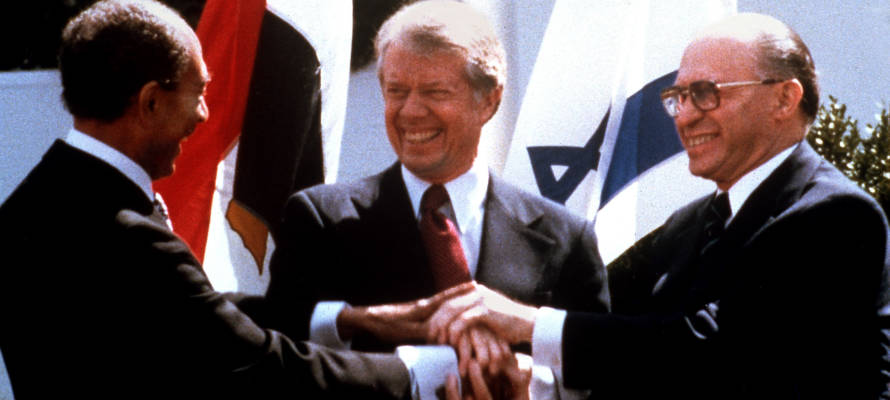Forty years of formal peace with Egypt has increased Egyptian-Israeli cooperation against terrorism. However, the formal peace is yet to reach the street level of Cairo.
By: Daniel Krygier, United with Israel
September 2018 marks the 40th anniversary since the Egyptian-Israeli Peace Accord at Camp David. This dramatic moment in modern Israeli history gave the Jewish state its first peace accord with a neighboring Arab state.
What does the formal peace with Egypt mean for Israel today and what is the outlook for the future?
Then-Egyptian President Anwar Sadat launched the Yom Kippur War in 1973 in order to raise the Egyptian morale. While the war started well for Egypt, it ended with Israeli forces positioned approximately 100 km from Cairo and encircling the Egyptian army.
Inability to defeat Israel and US aid eventually convinced Sadat that a peace agreement with Israel was in Egypt’s interest.
Much has happened since Sadat made peace with Israeli Prime Minister Menachem Begin 40 years ago. For years, the Jewish state enjoyed relative quiet along the Egyptian-Israeli border. In recent years, however, this relative peace has been challenged by Islamist terrorist groups operating in the increasingly lawless Sinai Peninsula.
While most of the terrorism has been focusing on Egypt, Israel has also been targeted, leading to a dramatically increased Egyptian-Israeli intelligence-sharing and anti-terrorism cooperation.
Despite 40 years of formal peace, Jerusalem’s relations with Cairo are largely limited to the political secular leadership headed by current Egyptian President Abdel el-Sisi. By contrast, on a street level the Egyptian-Israeli peace is much less felt.
Egypt is a country of contrasts. While Israeli tourists keep visiting Egyptian tourist resorts and remain an important source of income for Egypt, much of the Egyptian population remains negative towards Israel.
On one hand, its secular political leadership values intelligence and military relations with Israel as important components of its war against Radical Islam. On the other hand, anti-Semitism is flourishing in Egyptian media and literature. Infamous anti-Semitic books such as Hitler’s Mein Kampf and The Protocols of the Elders of Zion are bestsellers. Egypt has also produced several lavish TV series with clear anti-Semitic motives.
Has the War Ended?
As far as many regular Egyptians are concerned, the war with Israel never really ended. Egyptian individuals who try to reach out to Israel are often seen as “traitors.”
Much of the opposition to normalized ties with Israeli society comes from Egypt’s cultural and intellectual elite. This stands in stark contrast to other former enemies, like France and Germany, which today enjoy close ties. Both countries are peaceful and advanced European democracies. However, the situation in the Middle East is more complex.
While Israel is an advanced democracy, Egypt remains despotic and largely underdeveloped. Illiteracy remains a serious problem in Egypt, especially in the countryside and in the urban slums. Much of the negative feelings towards the Jewish state are based on ignorance and deeply rooted anti-Jewish myths.
While Jerusalem’s political and commercial ties with Egypt will likely continue growing, the vast disparities between the countries seriously limits the scope of the bilateral relations.
